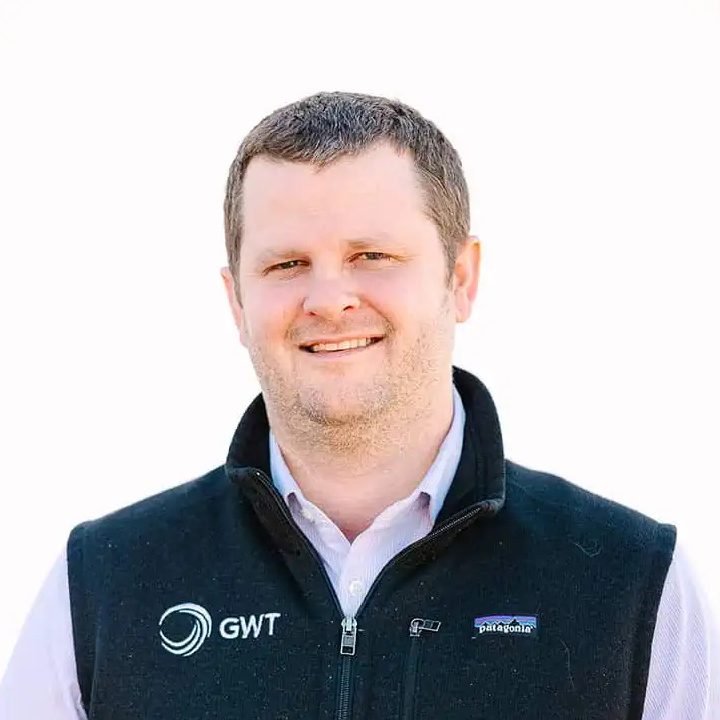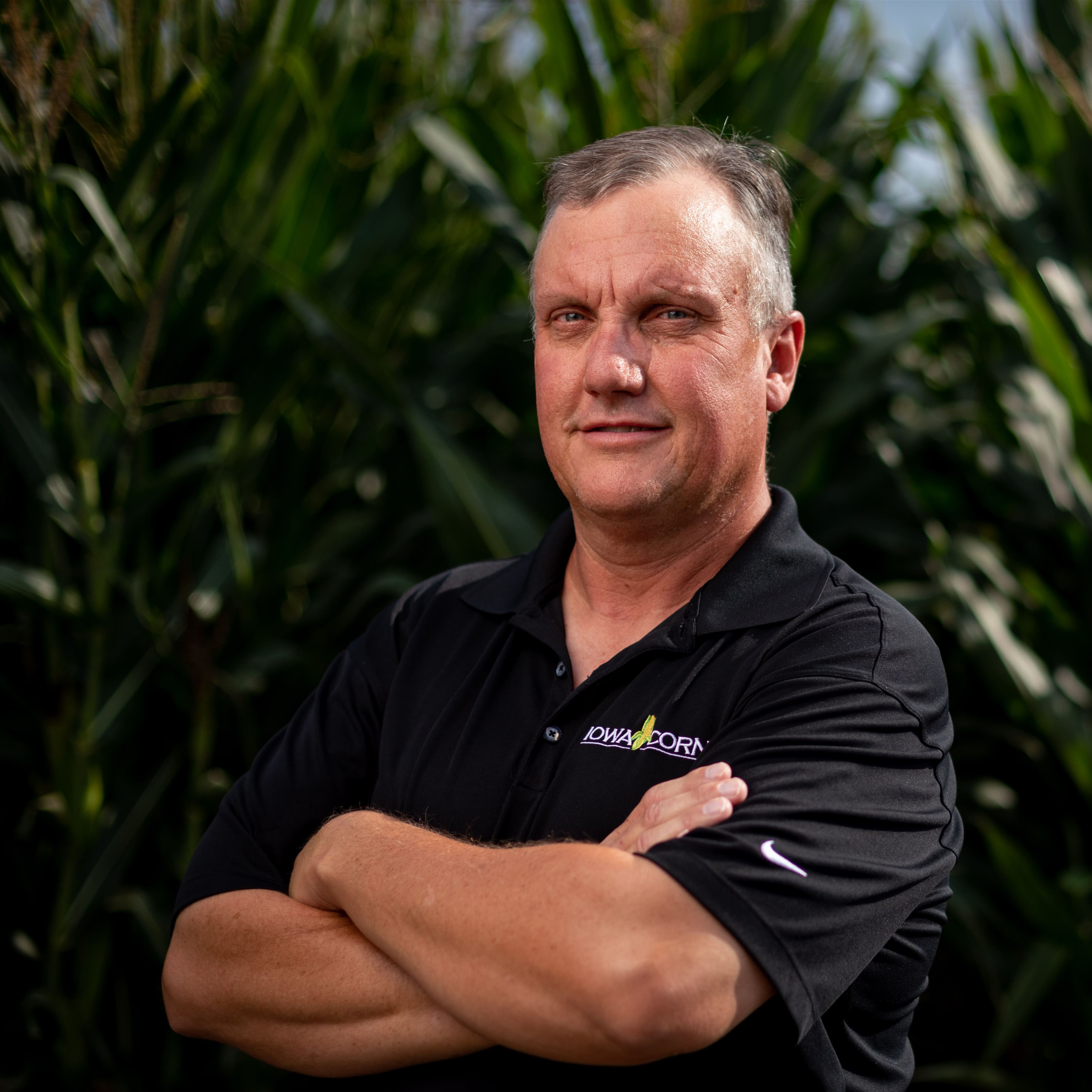It’s no secret that Iowa leads the way in renewable energy and solutions to make agricultural production and the food system more sustainable.
As the country’s leader in ethanol, biodiesel and wind energy production (as a percentage of total power output), and an established infrastructure to support new and growing bio-based ventures, we see innovation happening every day. Our state’s farmers are also making continuous improvements to produce more with less, backed by new technologies, practices and innovations developed at Iowa’s universities, startups and global leaders.
We asked leaders from throughout Iowa’s agricultural industry to share their insights on how innovation is driving sustainability throughout agriculture, and what they are most excited about as they look to the future.
Martin Gross
CEO and Co-Founder, Gross-Wen Technologies

As regulations and standards for water quality become more stringent across the country, cities and industries are looking for new options to treat water more efficiently, sustainably, and cost-effectively than ever before. Gross-Wen Technologies (GWT) was founded in 2014 to commercialize the innovative solution that uses algae to remove pollutants from wastewater, then transforms the resulting biomass into a slow-release fertilizer, bioplastic and biofuels. It started with technology I worked on during my graduate studies at Iowa State University with my major professor, Dr. Zhiyou Wen.
The technology is known as the revolving algal biofilm system (RAB), and is drawing interest from cities across the U.S. The RAB is not only effective at treating pollutants, it also provides a solution that can dramatically reduce the GHG emissions of wastewater treatment plants.
Our customers are cities and food processing companies who need to upgrade water treatment systems to comply with changing quality standards. We’ve worked with more than 40 cities and industries in Iowa, Wisconsin, Colorado, Illinois, Washington, Maine, Minnesota and Arizona, as well as projects in Canada, France, Japan and Singapore.
Another benefit to cities installing the algae-based system is the elimination of expense to dispose of the bacteria or chemicals used in conventional systems to treat water. In fact, Gross-Wen will purchase back the algal biomass from cities to convert that biomass into slow-release fertilizer pellets or other valuable products.
Gross-Wen Technologies has created 20 full-time jobs and 4 part-time jobs and opened their headquarters in Slater, Iowa, in late 2019. In 2024, GWT expanded into a new office in downtown Des Moines and recently opened an operations and R&D facility in rural Boone County. The company has secured $20 million through both grant, debt and equity financing. Gross credits Iowa’s entrepreneurial resources and networks for helping move Gross-Wen from a lab-based technology to a successful startup company.
As a native Iowan, I wanted to stay and build the business here. Through all the activities and mentoring programs, I’ve been able to engage with a pretty impressive network of people that helped support our business, whether it is providing advice, make connections or help promote the business.
Steve Kuiper
Farmer, Knoxville, Iowa

As a fourth-generation farmer from Marion County, southeast of Des Moines, I see every day the role that innovation plays in modern agriculture, especially at the farm level. I currently farm with my two sons, Kevin and Brandon. We raise corn and soybeans and custom farm for some folks that are nearing retirement and want to implement the newest technology available.
All the conservation practices we implement today are to ensure our future in farming, not only for me but for my children and grandchildren. It’s my goal to leave a farm to them in better shape than when I received it. We have waterways and terraces on all our farms, this is to reduce erosion. We use cover crops on our more erodible land, and land that has cows winter grazed, this helps with erosion, soil quality, and minimizing damage from cattle, and provides weed control in the early spring.
Looking ahead we are starting to use more biological fertilizers, which will help us reduce the use of commercial fertilizers. New genetics that better utilize fertility, and short stature corn, help with this transition.
Stacey Orlandi
President, Chevron Renewable Energy Group

At Chevron, we believe that the future of energy is lower carbon and it’s going to take all forms of energy to meet the growing global energy demand. We are excited about the potential for biofuels production to grow as more companies in the transportation sectors that are harder to electrify like heavy duty trucking, marine, rail and aviation implement lower carbon intensity fuels. More innovation in biofuels will happen throughout the value chain from seed companies to farmers to production plants to engine technology. The biofuels industry continues to rely on a combination of supportive policies at state and federal levels as well as industry collaboration between energy and agricultural players.
In my role at Chevron Renewable Energy Group, I oversee all aspects of the biodiesel and renewable diesel business. Before this role, I was the director of manufacturing for the organization for two years. Over the years I have had the opportunity to live around the world working in various aspects of technology, operations and commercial roles across refining, chemicals, renewables and natural gas.
As biofuels production continues to grow, so does the need for feedstocks (raw materials), and we have seen much innovation in this space. There has been a continued flow of investments in new and novel feedstocks and in the last few years, some of these are becoming a commercial reality. We have developed partnerships to progress the development of winter oilseed crops like camelina, winter canola and CoverCress. We are starting to see some commercial production where we can use this oil in our existing facilities for producing lower carbon fuels.
Chevron Renewable Energy Group has been a pioneer in process technology to produce both renewable diesel and biodiesel. We continue to invest in novel technology pathways to lower capital/operating costs and provide feedstock and product flexibility.
Chevron Renewable Energy Group is grateful to be based in Iowa, where we have access to quality resources to support the renewable fuels industry. One advantage Iowa offers for biofuels production is proximity to raw materials used in producing our fuels. Many of these feedstocks are byproducts of the agricultural industry including soybean oil, distillers corn oil, tallow and others. We are grateful for our partnership with the agricultural community and proud to be able to add value to their businesses.
Another advantage we find in Iowa is that there is a high level of research and innovation taking place related to renewable fuels in this state. We value our partnerships with Iowa State University and various trade associations in the state who are committed to helping to advance this industry.
A final advantage is remarkable support from our politicians to advance the biofuels industry. The support of our local, state and federal lawmakers has helped create strong state policy for biofuels enabling adoption in Iowa and helping grow the industry at a federal level.
Published August 2024.